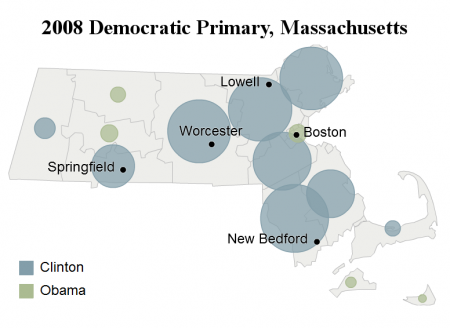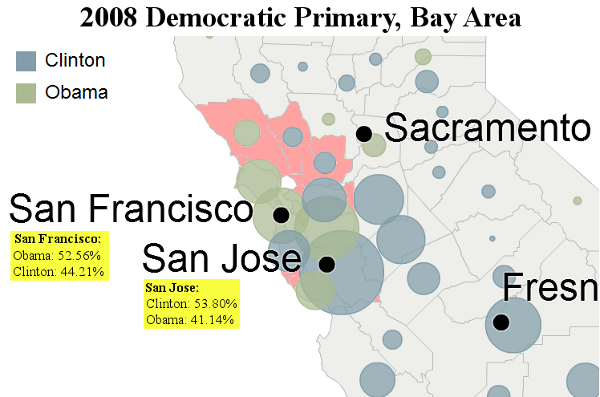• AR-Sen: PPP’s Tom Jensen has some interesting crosstabs from their AR-02 poll, which shed some light on Blanche Lincoln’s unique set of problems. Lincoln generates only lukewarm enthusiasm from her base: Barack Obama gets a 78% approval among Dems in the district, Rep. Vic Snyder is at 75%, and Mark Pryor is at 61%, but Lincoln is at only 43%, with 30% of Dems thinking she’s too conservative (although that may be coming to a head right now with her obstructionist role in the health care debate, which may not be much of an issue one year from now). Moving to the left, though, will cause her to lose votes with independents, though, among whom 49% think she’s too liberal.
• CT-Sen, CT-05: Local GOP party poohbahs are sounding eager to push state Sen. Sam Caligiuri out of the Senate race, where he’s rather, uh, underutilized, and into the 5th, for a race against Democratic Rep. Chris Murphy; Caligiuri says he’ll consider it. Problem is, Justin Bernier is already running there, and has had some fundraising success and gotten NRCC “Young Gun” status; as you might expect, Bernier is crying foul.
• FL-Sen: Charlie Crist has been trying to hide from his previous stimulus support, but Rolling Stone’s Tim Dickinson has the goods on him, dragging out an old interview from spring in which Crist says “absolutely” he would have voted for the stimulus had he been in the Senate at the time. Here’s one bit of good news for Crist, though; Marco Rubio‘s once-perfect A rating from the National Rifle Association is about to drop, thanks to Rubio’s compromise (from back when he was House speaker) on the take-your-gun-to-work law that recently became law.
• IL-Sen: Former Chicago Inspector General David Hoffman has an internal poll of his own now, and while it doesn’t give numbers for the Dem primary matchup between Hoffman and frontrunner Alexi Giannoulias, it does point to some vulnerabilities for Giannoulias. The poll claims that without message-testing, GOP Rep. Mark Kirk leads Giannoulias 40-37 and leads Hoffman 40-30, but once positives and negatives are read, Kirk beats Giannoulias 47-30 and Hoffman beats Kirk 42-36. The negatives involve the Giannoulias family bank, which apparently has been connected to Tony Rezko. Meanwhile, Kirk took an embarrassing hit from the conservative Chicago Tribune editorial board, whose response to Kirk’s flip-flopping and fearmongering on trying terrorists in New York boiled down to “Give us a break.” Wondering why Kirk is so transparently turning into a right-winger? Kirk’s looking increasingly nervous about erstwhile opponent Patrick Hughes, who is currently seeking out a Jim DeMint endorsement.
• KY-Sen, NH-Sen: The NRSC is claiming it’s not getting involved in primary fights with fundraising, but you can’t make party leadership’s intentions any clearer than when Mitch McConnell hosts a fundraiser in New York on Dec. 7 for Trey Grayson and Kelly Ayotte. With both candidates facing mounting anti-establishment challenges, it seems like the bad publicity back home generated by these appearances — more grist for the movement conservative mill — might outweigh the financial benefit.
• NJ-Sen: Now that recently unemployed TV pundit Lou Dobbs has some time on his hands, he told Bill O’Reilly he’s considering a run for the Senate in New Jersey. There isn’t a seat available until 2012 (when Dobbs will be 67) — he’d be going up against Bob Menendez that year. Dobbs vs. Menendez? Hmmm, you can’t get any more weighed down with symbolism than that.
• SC-Sen: The county GOP in Berkeley County (in the Charleston suburbs) was prepared to have its own censure vote against Lindsey Graham, but they called off the vote after Graham’s chief of staff promised to meet with them first.
• CA-Gov (pdf): Lots of people have taken notice that the Republican field in the governor’s race isn’t a diverse bunch: three sorta-moderates from Silicon Valley. San Jose State University took a poll of those who would seemingly know the candidates the best: Republican likely voters in “Silicon Valley” (Santa Clara and San Mateo Counties, plus small parts of Alameda and Santa Cruz Counties). Perhaps thanks to Tom Campbell’s tenure in the House representing much of this area, he has a wide lead, at 39%, compared with 11 for Meg Whitman and 7 for Steve Poizner.
• MI-Gov, MI-08: In case there was any doubt that Rep. Mike Rogers (the Michigan one) was going to run for re-election to his House seat and not for governor, we found a statement from way back in February to that effect. (H/t to Mr. Rogers’ Neighborhood, a blog devoted to all things MI-08.)
• MN-Gov: Rasmussen looks at the still-coalescing primary fields in the Minnesota governor’s races, and seems to be finding very name-recognition-driven results right now. On the Democratic side, most of the votes are going to former Senator Mark Dayton and Minneapolis mayor R.T. Rybak; both poll at 30, trailed by state House speaker Margaret Anderson Kelliher at 8 and former state legislator Matt Entenza at 6. On the Republican side, ex-Sen. Norm Coleman dominates, with 50%; however, he’s not in the race, at least not yet, and is probably the only name that people know. Among the rest of the rabble, former House minority leader Marty Seifert is doing the best, at 11, with 5 for Laura Brod and 1 for Tom Emmer.
• OR-Gov: Most people have already mentally ruled out Rep. Peter DeFazio from the governor’s race, but he just said that he’s still somewhat interested, and that he won’t be making up his mind on it until… next March? He doesn’t seem too concerned about the delay, as Oregon law would let him transfer over his federal dollars and he alludes to private polling showing him in a dead heat with John Kitzhaber. While I still doubt he’ll follow through, that raises the question of who might fill a vacancy in OR-04; it’s looking less and less like it would be Springfield’s Republican mayor Sid Leiken, who was just fined $2,250 by the state for the phantom poll that may or may not have been conducted by Leiken’s mom.
• TX-Gov: Little-known fact: Kay Bailey Hutchison, despite the seeming overall malaise in her campaign, has a big edge in endorsements from Texas House Republicans. She has the endorsements of 10 of 20 (including Kay Granger, Kenny Marchant, and Michael Burgess), perhaps indicative of Rick Perry’s increasingly strident anti-Washington rhetoric. (Not that that will help much when the actual electorate is in an increasingly anti-establishment mood.) A couple other Dems are looking at the race: hair care magnate Farouk Shami (who’s willing to bring his own money to the race) is officially launching his campaign on Thursday, while El Paso-based outgoing state Sen. Eliot Shapleigh is publicly weighing a run.
• FL-19: West Palm Beach mayor Lois Frankel, who would have been maybe the highest-profile possible primary challenger to state Sen. Ted Deutch in the upcoming special election in the 19th, has decided not to run. Deutch has been endorsed by outgoing Robert Wexler and has an increasingly clear path to the nomination. Meanwhile, the only GOPer looking interested in running in the dark-blue district is Ed Lynch, who lost to Wexler last year.
• IL-06: Here’s a little more information about Benjamin Lowe, who’s the only Dem running in the 6th against Peter Roskam. While he’s something of a political unknown, it turns out he’s well-connected in the religious left community as well as the green jobs movement. He’s a graduate of evangelical Wheaton College (which is in the district) and has been active in the last few years in organizing students at other evangelical colleges on issues of environmental stewardship.
• NY-13: I don’t know if anything can top last year’s NY-13 race for political trainwrecks, but the Staten Island GOP may have gotten switched onto that same track again. Michael Allegretti, a 31-year old who caught attention for raising $200K for the race already, is a lawyer who also owns a share of the family business, Bayside Fuel and Oil — which employed Gambino family capo Joe “Joe Butch” Corrao for several decades. Over $40K of Allegretti’s contributions came from family members working for Bayside. To add to the made-for-TV drama: Allegretti’s potential Republican primary opponent, Michael Grimm, was on the FBI squad charged with investigating said crime family.
• NY-19: Republican Greg Ball — who puts the “Ass” in Assemblyman — is out with an internal poll putting him within single digits of Rep. John Hall. Hall leads the Hall/Ball matchup, 48-43 — although for some reason the poll was taken only in the portion of the district that’s east of the Hudson River. Hall still has strong favorables, at 57/25, while Ball is at 40/28.
• NY-23: Recounting in NY-23 is still on track to see Rep. Bill Owens remain in the House; Doug Hoffman is down 2,951 votes with 6,123 left, so about the best he can hope for is to lose by about 2,000. The Hoffman saga just got weirder when yesterday Hoffman, goaded along by his patron Glenn Beck, unconceded on national TV — yet today, his spokesperson un-un-conceded, not that any of that is legally binding, of course.
• NRCC: If the Republicans are going to make a serious dent in the Democratic edge in the House next year, they’re going to have to refill the NRCC’s coffers, which are still lagging the DCCC. Party leadership smacked down members in a closed-door session, trying to get them to pony up their $15K dues. The Hill also has an interesting profile of CA-22’s Kevin McCarthy, an up-and-comer who’s the NRCC recruitment chair now and likely to head the NRCC at some point in the near future. Turns out that McCarthy is quite the student of Rahm Emanuel.
• Mayors: SurveyUSA polls the runoff in the Atlanta mayor’s race, and they have quite the reversal of fortune for Mary Norwood, who led all polls before November and finished first in the election. State Sen. Kasim Reed, who finished 2nd, now leads Norwood, 49-46. Reed leads 69-25 among African-American voters, indicating that he picked up almost all of 3rd-place finisher Lisa Borders’ support.
• Special elections: Two legislative specials are on tap tonight. The big one is California’s AD-72, a Republican-leaning seat in the OC left vacant by the resignation of Mike Duvall (who resigned in disgrace after bragging about his affair with a lobbyist). It seems to be mostly a contest between two GOPers, Orange County Supervisor Chris Norby and activist Linda Ackerman (who’s been making much of Norby’s four divorces). Since this is California, assuming one of the Republicans doesn’t finish over 50%, it’ll move on to another round where the top Republican faces off against Dem John MacMurray. Also, in Mississippi, there’s a contest in Biloxi-based HD-117, to replace Republican state Rep. Michael Janus; candidates aren’t identified by party on the special election ballot, but the contestants are Patrick Collins (who ran against Janus several times) and Scott DeLano.
• Redistricting: You might want to check out the website called “Redistricting the Nation,” presented by GIS software company Avencia but full of fun widgets. Most interestingly, you can evaluate the compactness of any congressional district by four different criteria, and see the worst offenders in each category.




